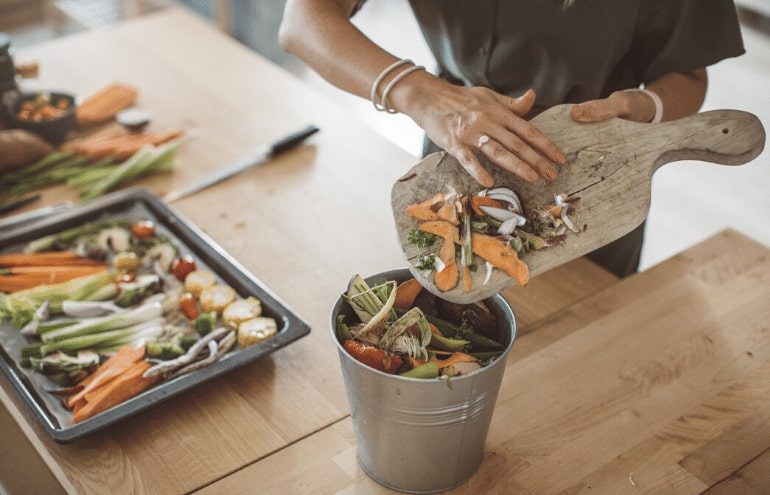Across the UK, families produce more than 26 million tonnes of waste every year, and approximately half of it still ends up in landfills. However, an increasing number of inhabitants, schools, and local associations attest that waste can be turned into value.

However, there are recycling program that aids, but the reality is that how much is discarded can be transformed, repurposed, and reused into something valuable and new.
But what sometimes looks like a little mindfulness and creativity might turn a trash can become a treasure.

Decreasing the household’s waste is not just good for the planet, as it saves money, inspires creativity, and carries a sense of achievement. The best part is that many waste-reducing tactics are easy to accept and can be implemented properly at home.
From Leicester Council’s waste reduction advice:

“Refashion and upcycle. Give your old clothes a fresh look or new lease of life by altering them, accessorising, or combining clothes in new ways.”
To turn everyday items into something useful, let’s explore the practical ways and creativity while cutting down on what ends up in the trash.

How to Reduce Household Waste?
- Reconsider, Not Just Recycle
Generally, sustainability is associated with the recycling bin; however, the real conversion changes before that.

- For cooking oils and detergents, move to reusable vessels.
- Instead of pre-packaged goods, buy some movable produce.
- While on the drive, carry a reusable coffee cup and a cutlery set.
- Upcycling: Turning the Old into New
The term upcycling is defined as the conversion of unsolicited materials into something beautiful or useful. This is generally manageable, artistic, and budget-friendly.
- The old furniture flips, such as cabinets, chairs, can be painted, sanded, and sold or reused.
- For homemade candles or pantry goods, the glass jars become storage.
- The old T-shirts change into cleaning cloths or reusable shopping bags.
On home repair and furniture restoration, workshop is hosted in UK towns, Repair Cafes or Men’s Sheds, which combine community engagement with waste reduction.
- Composting: Nature’s Recycling Plant
In the UK, about 30% of families’ waste is food. Composting distracts the waste from landfills and cultivates the garden soil.
Simple approaches:
- Start a nourishment bin or heap using the garden waste or kitchen leftovers if you have an outside space.
- Try a worm composter or a bokashi bin for flats, as both work indoors.
- The food waste is separately collected by many councils. Check if it offers free caddies.
The household’s annual landfill contribution can be reduced by a compost system by nearly 200 kg.
This week, in your kitchen, keep a small container for food and watch how much less goes into the main bin.
According to the same programme:
“The programme, called ‘Maximising Resources, Minimising Waste’, brings together a range of measures … which will help to keep products and materials in circulation for as long as possible and at their highest value, including through increasing reuse, repair and remanufacture…”.
- The Power of Sharing and Swapping
Across UK communities, the “sharing economy” is reshaping waste habits.
- Instead of buying new things, borrow the sewing machines, camping gear, or power tools.
- The events are swapped by the neighbourhood, and the residents trade books, household items, and clothes.
- The locals are connected through Olio and Freecycle to give away or demand leftover food and unwanted goods.
Into community resources, these networks turn surplus.
SNAPSHOT Table: From Trash to Treasure: Creative Ways to Reduce Household Waste
| Waste Item | Creative Use | Benefit |
| Glass jars | Storage or crafts | Replaces plastic |
| Old clothes | Rags or bags | Reduces textile waste |
| Cardboard boxes | Storage or playhouses | Easy reuse |
| Food scraps | Compost or fertilizer | Less food waste |
| Plastic bottles | Planters or feeders | Supports upcycling |
| Tin cans | Holders or lanterns | DIY home use |
| Egg cartons | Seed starters | Eco-friendly gardening |
From Gateshead Council’s guidance:
“Packaging can be given a second life instead of being thrown away: wash and reuse old jars, pots, or containers as storage throughout your home.”
- Repair Before Replace
Each year, the families of the UK throw away more than 1.5 million tonnes of electrical waste, which is still repairable.
Before replacing:
- In most of the UK, visit a Repair Café. The volunteers support fixing bikes, textiles, and small appliances.
- Check if the product comes under the Right to Repair rules, which require a spare part for a minimum of 10 years for many uses.
- For easy fixes, look for the YouTube tutorials or brand-certified repair guides.
- Smart Shopping and Bulk Buying
Waste often begins in the shop aisle. Buying smart helps cut packaging and saves money.
- For grains, cleaning refills, and pulses, choose the bulk stores.
- Go for the eco-labels with compostable or recyclable packaging.
- The zero-waste market needs to be supported. Many UK cities, such as Leeds, Brighton, and Bristol, have flourishing refill scenes.
From the UK Government (DEFRA) press release “Maximising Resources, Minimising Waste” (28 July 2023):
“New plans setting out the government’s long‑term aim to use fewer new resources, drive up the repair and reuse of existing materials, and increase recycling…”
- Creative Repurposing at Home
Not every eco-idea has to be grand — small projects make real change.
- Wine corks → noticeboards or plant labels
- Toilet rolls → seed starters for gardens
- Old jeans → storage baskets or door mats
- Tin cans → pen holders or planters
Families often turn this into fun weekend DIY projects, teaching children about sustainability and creativity together.
FAQs
What is the easiest step for a beginner to reduce waste?
The beginners can start with the waste audit. For this, check the bin for at least one week and note the frequently occurring items. Then, after, emphasize cutting those categories, such as food waste or single-use plastic.
Are the zero-waste or refill shops expensive?
Not necessarily. Buying what you need usually balances the costs, while some charge slightly more per unit. However, for the purchases, many local co-ops offer discounts.
How can urban residents compost without the gardens?
It can be done through vermi-composters, bokashi bins, or sign up for community composting programs. There are growing networks in Edinburgh, London, and Manchester.
What can one do with the broken electronic items?
Consider the WEEE-certified drop-offs or council recycling centres if the repair is not viable. The electronic item should never be binned, as they have hazardous components and valuable metals.

